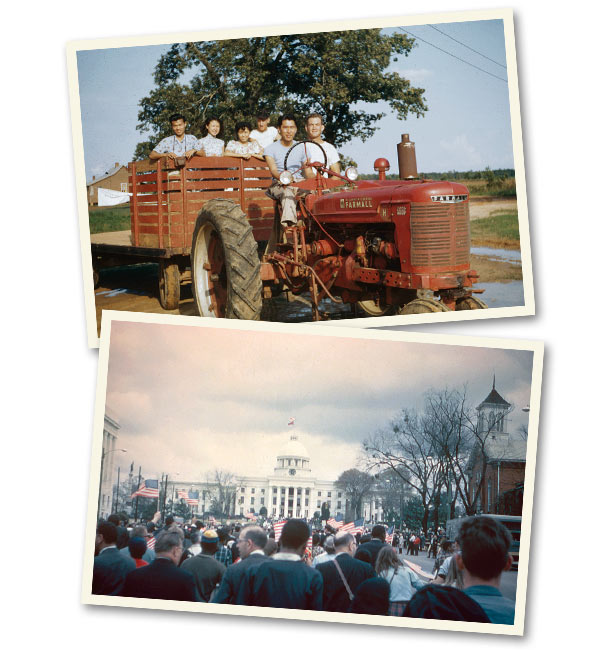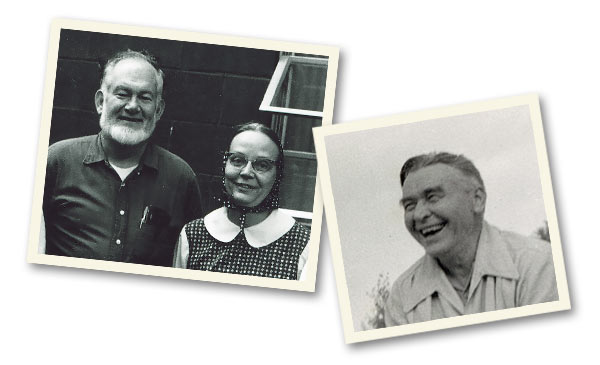Subtotal: $
Checkout-

Letters from Readers
-

Covering the Cover: Pain and Passion
-

Oberammergau’s Broken Vow
-

The Unutterable Silence of God
-

The Mind in Pain
-

In Search of Solace
-

Where Are the Churches in Canada’s Euthanasia Experiment?
-

Letters from a Vanishing Friend
-

The Dust on All the Faces
-

Two Thousand Years of Christian Strangeness
-

God’s Purpose in Your Pain
-

Saving Friends: What I’ve Learned from Insufferable Patients
-

The Speaking Tree
-

The Way of the Passion
-

Chinese Christians’ Costly Allegiance
-

Baptism Means Leaving Home to Find It
-

Felix Manz: The Making of a Young Radical
-

The Return of the Bison
-

The Communion of Empty Hands
-

Poem: “Zeal”
-

Poem: “Winter”
-

Editors’ Picks: Demon Copperhead
-

Editors’ Picks: How to Inhabit Time
-

Editors’ Picks: Faith, Hope and Carnage
-

The Gift of Palliative Care
-

Transforming Food

On Planting Sugar Maples
How do you pass on a legacy, and how do you receive one?
By David Johnson
May 6, 2023
Available languages: español
“A good man leaves an inheritance for his children’s children.”
—Proverbs 13:22
On a recent visit to my childhood home, I walked under trees I had planted as a teenager. What were once spindly maple saplings dug out of the woods and transplanted with hope of future maple syrup production are now thirty-foot trees. The copper beech, given to us by a neighbor in exchange for planting one for him, is now forty feet tall and providing summer shade. The wild azaleas, dug out of the western Pennsylvania woods to plant in our cemetery, now bloom near the graves of dozens of my childhood mentors.
My lifelong love for gardening and horticulture began when my parents, Howard and Marion Johnson, started us on a family garden that we kids tended with Dad’s advice. (He had exhausted his desire for land work during the Great Depression, with countless childhood hours spent chopping cotton, followed by years of large-scale farming in southwestern Georgia where he grew peanuts, corn, sweet potatoes, and forage crops.) And as I remember my parents, I can’t help considering their improbable journey up from the Bible Belt South, a journey both geographical and spiritual.
My parents did not leave me a material legacy, but rather something much more valuable: a life lived in service to Jesus, sharing in full community of goods, and welcoming all others seeking to live out the kingdom of God in the here and now. They did not pressure or persuade me to do the same, but their example of devotion to their brothers and sisters ultimately proved irresistible.
Dad and Mom began their life in Christian community at Koinonia Farm in Americus, Georgia, right after their wedding in 1949. They then moved to the Bruderhof in 1956. Because we left Koinonia when I was four, my memories are few: playing with Tippy, my beloved puppy; gashing my leg jumping off a corrugated tin table; watching Florence Jordan cut off the head of a rattlesnake.

Top, Howard Johnson (far right) working at Koinonia Farm; bottom, Howard Johnson’s photograph of the 1965 march from Selma to Montgomery. All photographs courtesy of the author.
But all my life, my parents told us about the Koinonia venture with its Gospel-based stand against racism and war, lived out in the context of Christian community. They could not say enough about Clarence Jordan, Koinonia’s visionary founder, and how his witness drew them out of their Bible-Belt inheritance of racism, patriotism, and the dream of upward mobility. My father often spoke of his visit to Martin Luther King Jr.’s home in Montgomery, Alabama, shortly after it was bombed in 1956. Stopping in unannounced, Dad was welcomed in by Dr. King to spend the evening. His connection to Koinonia was enough to gain the family’s trust and friendship.
As I grew older, I began to understand what my parents’ radical decision to follow Christ cost them. Ostracized by their relatives for their opposition to segregation, they found their once-promising careers cut off by their decision for a life of voluntary poverty at Koinonia, where their days were filled with unrelenting work. Yet they never spoke a word of complaint about any of it.
Later, in the 1960s, Dad – a World War II veteran turned pacifist – participated in anti–Vietnam War protests in Washington, DC, and brought home literature that exposed our military’s intervention in Southeast Asia for what it was. He counseled numerous young men on how to become conscientious objectors, an act of repentance for his role as a navigator of a B-29 Superfortress in World War II, in which he flew multiple bombing missions over Japan.
The 1965 civil rights march from Selma to Montgomery that Dad joined became a highlight in his memory. Knowing the risks, he told me before he left that he might not come back alive, and asked me, age thirteen, to be ready to care for my mother and siblings.
I, too, wanted a life dedicated to the fight for racial justice and against war, and dreamed of joining the turbulent social revolutions of the 1960s. The community I grew up in did not do enough, I felt, to actively combat the ills of society.
At the same time as I was absorbing the witness of my parents, I began to work with Alfred Gneiting, the community’s gardener, who years later would become my father-in-law. Alfred was born in Germany, with a childhood shadowed by the Great War and a soul longing for some way to respond. Rebelling against the Marxist socialism of his stepfather, Alfred had first participated in the YMCA, which at that time had a strong evangelistic focus. Drawn by the German Youth Movement, he joined a free-flowing band of youths who traveled the countryside, seeking a deeper connection to nature and an escape from the status quo, from organized religion to political intrigue to class divisions. Eventually, at the age of twenty, he found his way to Sannerz, the first Bruderhof community, in 1924. Here his ideals could get to work.
Seeing my interest in planting trees, Alfred drafted me to help him with his landscaping work, a job I kept through my high school years. From Alfred I learned to plant trees the “correct” way: his way. He demanded absolute adherence to his instructions. We spent hours wheeling barrows of topsoil and compost to our projects, often up a steep hill. Because of his emphysema, Alfred would pause frequently to catch his breath.
During these pauses he would tell me about his elation at finding a life of brotherly community. He recounted one anecdote after the other about Eberhard Arnold, whose understanding love, warmth, and clarity drew out the best in Alfred and the other strong-willed individualists whom God had assembled to build up a life based on the early Christian way. Thus I absorbed the legacy of the early years of the Bruderhof community and of Arnold’s prophetic voice. Though my sense of unbelonging persisted, seeds were sown that would take root and blossom later.

Left, Howard and Marion Johnson; right, Alfred Gneiting.
After graduating from high school in 1969, I set off to make my mark on the world, filled with the confident assurance that I was ready for anything. While proud of my parents’ work in building a radical alternative to the American Dream and deeply influenced by Alfred’s example, I did not have a personal faith in God or belief in Jesus Christ. Before I could embrace and own my legacy, God had to break down my self-assurance so that I could recognize my own sinfulness and seek the peace and healing of Christ in my own life. As a friend once told me, “God has no grandchildren. He only has children!”
Back home on a visit from college just days before my eighteenth birthday, I attended a church service which included a reading from Eberhard Arnold: “The Great Objective.” It reiterated concepts that I had heard repeatedly ever since I could remember. However, on that Sunday, October 12, 1969, my heart finally opened to their message:
The kingdom of God is in the future, but its effect extends into the present. … This is a justice which takes practical shape as economic and social brotherhood among men; a peace which means we live in peace with each other and can have nothing to do with war, violence, or lawsuits; a joy which means that what we do is ruled by love for others and joy in them. … The real evidence of the Holy Spirit’s action is unity and community in daily work and life, harmonious sharing of production, consumption, labor, leisure, grief, joy, aims, actions, and all of life. If this unity is missing, it is better not to do so much singing, praying, and preaching. … Trusting faith can already see the whole earth flooded in light with the dawning of God’s kingdom. … This is what we are to live for, and in the strength of grace, can live for. There is work to do!
Hearing those words, it dawned on me with unforgettable clarity that God was calling me to live for his kingdom in full community of goods with these particular brothers and sisters. The legacy of Alfred and of my parents now became mine: they were the good men of the proverb who had “left an inheritance for their children’s children.” I finally understood that everything I’d dreamed of finding had been right in front of me the whole time.
Fifty-three years later, it’s my turn to speak with young men and women of the upcoming generation who are asking the eternal questions – what can I give my life to? How can I make it count? When I look up at the tall trees that Alfred and I planted together, or the wild azaleas that now bloom near his grave, when I see how far their roots have extended into the good soil and toward each other, it occurs to me that it is much the same work.
Already a subscriber? Sign in
Try 3 months of unlimited access. Start your FREE TRIAL today. Cancel anytime.




































